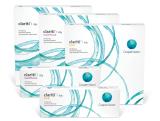
Pregnancy affects every part of the body—including your eyes. Hormones, metabolism changes, fluid retention, and altered blood circulation all have an impact on eyesight during pregnancy.
Most pregnancy-related symptoms are minor and will subside once the baby is born or after the baby is weaned, but others may signal a more serious problem that requires immediate medical attention.
Common Eye Conditions During Pregnancy
Are you retaining water? How well your rings fit is a tell-tale sign. Water retention can increase the thickness and curvature of the cornea, causing a small shift in your prescription.1 This doesn’t usually necessitate a prescription change in your contacts or glasses because the change is temporary and will likely reverse on its own within a few months of delivery.
Dryness and irritation in the eyes due to the shifting hormones is another common complaint during pregnancy. If this prevents you from wearing your current contacts, ask your eye doctor about what options are best for you.
If you have pre-existing eye disease, pregnancy can further affect the condition. The same goes for systemic disease. For example, if you have diabetes, you should make an appointment with an ophthalmologist before conceiving and then again early in your pregnancy. A diabetic retinopathy screening is important, since this often worsens during pregnancy. Also, ask your eye doctor if your current medication is safe for the baby.
When to Seek Help
Some symptoms can be a sign of a more serious disorder. For example, high blood pressure or preeclampsia both can cause vision disturbances. Call your midwife or OB if you have any of the following symptoms:
- Excessive swelling or puffiness
- Double vision
- Blurry vision
- Light sensitivity
- Loss of vision
- Seeing floaters and flashing lights
Keeping Eyes Healthy When You’re Pregnant
Some pregnancy-related eye symptoms can be relieved with a good diet. Foods high in omega-3 fatty acids (DHA and EFA) might help relieve your dry eye symptoms while also contributing to the healthy development of your baby’s brain. Cooked salmon, walnuts and flax seeds are good sources of these nutrients.
Nothing in this blog post is to be construed as medical advice, nor is it intended to replace the recommendations of a medical professional. For specific questions, please see your eye care practitioner.
1. American Academy of Ophthalmology. Ocular Changes During Pregnancy. Available at https://www.aao.org/eyenet/article/ocular-changes-during-pregnancy






